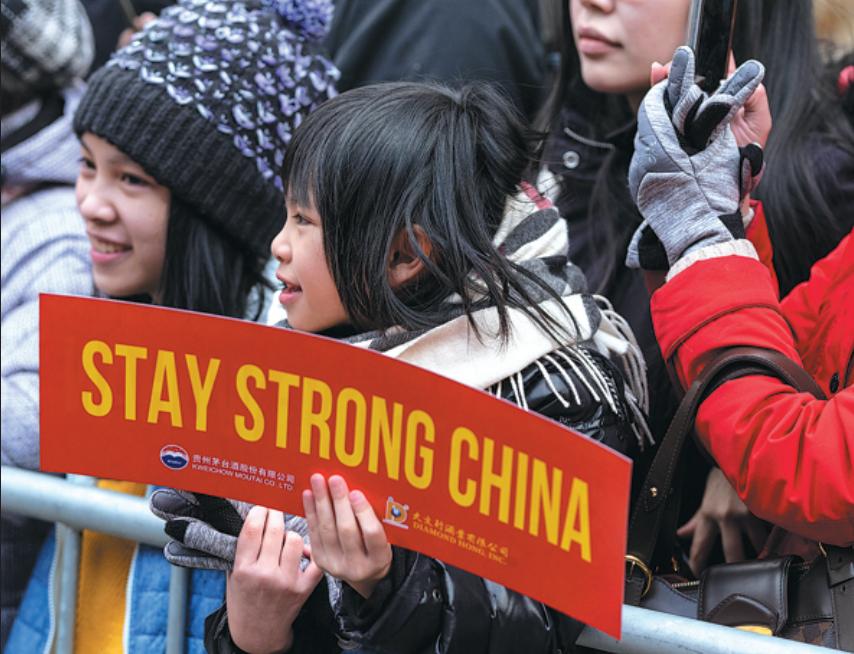
A child holds a sign board while watching a Lunar New Year parade in the Chinatown neighborhood of New York in the United States on Feb 9. [Photo\Agencies]
The sudden outbreak of the novel coronavirus in China is threatening the lives and health of people in China, and its impacts go beyond the country.
In the spirit of humanitarianism, people from all over the world have offered assistance and cares to China in various ways. With the spread of the epidemic, some countries, however, have made insulting, discriminatory remarks against China and the Chinese people, such as "Coronavirus, made in China", "Chinese virus", or "yellow peril", and "China is really the sick man of Asia". Some countries have overreacted by excluding tourists from China or discriminating against local Chinese, which has had a bad influence in the international community, so much so that even some Westerners themselves find it hard to tolerate such acts and condemn them.
Some countries have realized their mistake and made an open apology to China, but some have shown no sense of regret, and even tried to use so-called freedom of speech to whitewash their words and acts. Under the guise of freedom of speech they are violating human rights. Is it fear of the virus, or malicious discrimination against Chinese? In essence, these words and acts have gone far beyond normal preventive measures to curb the spread of the virus or a fearful response to a potential pandemic. They are, in essence, the spread of racial discrimination on the back of such fears, which constitutes exploitation of the epidemic for discrimination that aims to subvert the human rights values of equality and non-discrimination, and challenge the international human rights system.
As UN Secretary-General Antonio Guterres pointed out while some people look at a virus from a discriminatory perspective and have an inclination to violate human rights, Article 3 of the International Health Regulations stipulates that human dignity, human rights and fundamental freedoms should be fully respected. After a visit to China, WHO Director-General Tedros Adhanom Ghebreyesus stressed that the way to fight the epidemic is "solidarity and cooperation", "not stigmatization".
To combat discrimination is the basic principle of the international system of human rights with the UN Charter at its core. Discrimination on the basis of nationality, race or specific groups of people is strictly prohibited by international framework for human rights. The UN Charter emphasizes the promotion of respect for human rights and fundamental freedoms of all human beings, irrespective of race, sex, language or religion. The 1948 Universal Declaration of Human Rights proclaims that mankind shall be treated in a spirit of brotherhood and shall be free from any act of discrimination in violation of this declaration and from any act that incites such discrimination. Article 2 of the 1966 International Covenant on Economic, Social and Cultural Rights also states that the rights proclaimed in this covenant shall be universally applied without any distinction as to race, skin color, sex, language, religion, political or other opinions, nationality, or social origin, property, birth, or other status. In order to highlight the special significance of anti-discrimination for all human beings, the international community has adopted a series of international human rights conventions specially designed to combat discrimination, in which the principles of equality and non-discrimination are red lines that must not be crossed.
Indeed, at a time when a natural disaster seriously threatens human life and health, in order to deal with the crisis, it is necessary that countries take specific preventive and restrictive measures, shoulder their obligations to protect their citizens and strengthen the protection of their right to health and safety. However, such obligations are not without boundaries and the red line of nondiscrimination should not be crossed, as stipulated by the International Covenant on Civil and Political Rights. According to Article 4 of the Covenant, under no circumstances shall discrimination because of race or skin color be allowed, and even if there is a life-threatening state of emergency, there can be no discrimination based on race or skin color. Any insulting remarks and acts against China and the Chinese people under the guise of self-protection against the novel coronavirus completely deviate from a country's obligations set by international human rights conventions and are a violation of the spirit of international law that demands respect for the dignity of people.
After the outbreak of the new coronavirus, some foreign media outlets have made use of it to publicize and arouse dissatisfaction and discrimination against the Chinese people, which constitutes the incitement of discriminatory behavior, as defined by Article 7 of the Universal Declaration of Human Rights.
Since the coronavirus outbreak, China has made the highest-level response and taken the fastest and most stringent prevention and control measures that go beyond the standards set by the International Health Regulations. Just as WHO chief Tedros said, China deserves gratitude and respect for fighting the virus so resolutely. Under such circumstances, any attempt to add fuel to the fire or to throw stones into the well with discrimination toward China and the Chinese people is clearly incompatible with the spirit of the international human rights law.
The author, Wang Xigen, is the dean of the School of Law, Huazhong University of Science and Technology. The views do not necessarily reflect those of China Daily.
原文链接:
http://www.chinadaily.com.cn/a/202002/20/WS5e4e77d5a310128217279140.html?from=groupmessage&isappinstalled=0